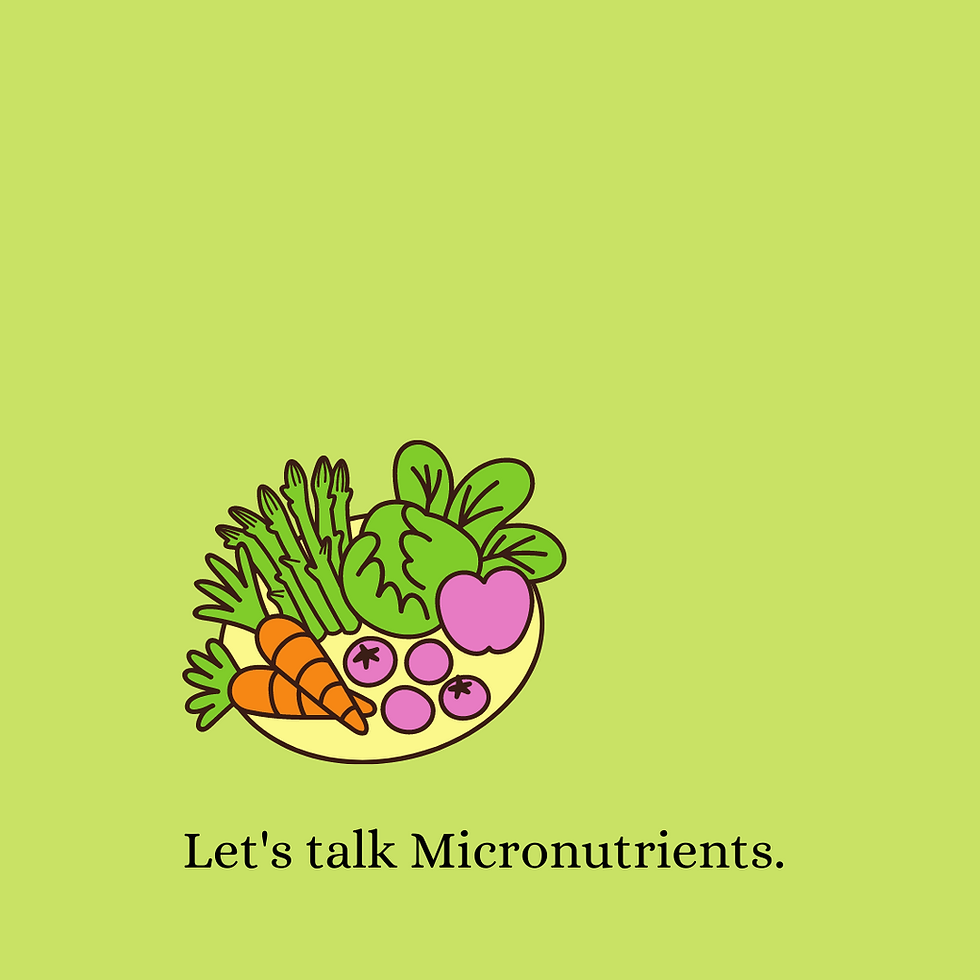Nutrition 101 - Micronutrients
Micronutrients are one of the major groups of nutrients your body needs. They include vitamins and minerals.

Your body needs smaller amounts of micronutrients relative to macronutrients. That’s why they’re labeled “micro” (micro meaning small). Remember, macronutrients are the proteins, fats and carbohydrates.
For the most part, we must obtain micronutrients from food since our bodies cannot produce vitamins and minerals. That’s why they’re also referred to as essential nutrients.
Vitamins are organic compounds made by plants and animals which can be broken down by heat, acid or air. On the other hand, minerals are inorganic, exist in soil or water and cannot be broken down. When you eat, you consume the vitamins that plants and animals created or the minerals they absorbed.
There are a few main kinds of micronutrients that you should have in your diet:
Water-soluble vitamins - vitamin C and the B vitamins: thiamine, riboflavin, niacin, pantothenic acid, B6, biotin, folic acid, and B12.
Best food sources of vitamin C-
Citrus (oranges, kiwi, lemon, grapefruit)
Bell peppers
Strawberries
Tomatoes
Cruciferous vegetables (broccoli, Brussels sprouts, cabbage, cauliflower)
White potatoes
Best food sources of B vitamins-
Whole grains (brown rice, barley, millet)
Meat (red meat, poultry, fish)
Eggs and dairy products (milk, cheese)
Legumes (beans, lentils)
Seeds and nuts (sunflower seeds, almonds)
Dark, leafy vegetables (broccoli, spinach, kai lan)
Fruits (citrus fruits, avocados, bananas)
Fat-soluble vitamins - Unlike water-soluble vitamins, fat-soluble vitamins dissolve in fat, not water - Vitamins A, D, E, and K. Pointer, these are the vitamins that you have to take with food if you are supplementing, otherwise they are not absorbed.
Best food sources of Vitamin A-
Leafy green vegetables (kale, spinach, broccoli), orange and yellow vegetables (carrots, sweet potatoes, pumpkin and other winter squash, summer squash)
Tomatoes
Red bell pepper
Cantaloupe, mango
Beef liver
Fish oils
Milk
Eggs
Best food sources of Vitamin D-
Cod liver oil
Salmon
Swordfish
Tuna fish
Orange juice fortified with vitamin D
Dairy and plant milks fortified with vitamin D
Sardines
Beef liver
Best food sources of Vitamin E-
Wheat germ oil
Sunflower, safflower, and soybean oil
Sunflower seeds
Almonds
Peanuts, peanut butter
Beet greens, collard greens, spinach
Pumpkin
Red bell pepper
Best food sources of Vitamin K-
Green leafy vegetables such as kale, collard greens
Broccoli
Spinach
Cabbage
Lettuce
Minerals - These include calcium, copper, iron, magnesium, manganese, iodine, phosphorus, selenium, potassium, cobalt , and zinc. These are sometimes divided into trace and major minerals. Trace minerals are needed in smaller amounts than major minerals.
Best food sources of Calcium-
Cheese
Yogurt
Milk
Sardines
Dark leafy greens like spinach, kale, turnips, and collard greens
Fortified cereals such as Total, Raisin Bran, Corn Flakes (a lot of calcium in one serving)
Fortified orange juice
Soybeans
Best food sources of Copper-
Oysters and other shellfish
Whole grains
Beans
Nuts
Potatoes
Organ meats (kidneys, liver)
Dark leafy greens,
Dried fruits such as prunes
Cocoa
Black pepper
Yeast
Best food sources of Iron-
Fortified breakfast cereals
Cooked oysters
White beans
Dark chocolate
Organ meats
Soybeans
Lentils
Spinach
Best food sources of Iodine-
Seaweed (nori, kelp, kombu, wakame)
Fish, shellfish (cod, canned tuna, oysters, shrimp)
Table salts labeled “iodized”
Dairy (milk, cheese, yogurt)
Eggs
Beef liver
Chicken
Best food sources of Phosphorus-
Meats and other proteins: beef, chicken, fish, and organ meat like liver
Milk and dairy foods: eggs, cottage cheese, and ice cream
Beans: navy, kidney, soy, pinto, and garbanzo
Grains: bran and wheat germ
Nuts and seeds: almonds, cashews, peanut butter, and sunflower seeds
Best food sources of Selenium-
Brazil nuts
Tuna
Halibut
Sardines
Roasted ham
Shrimp
Enriched macaroni
Turkey
Best food sources of Potassium-
Leafy greens, beans, nuts, dairy foods, and starchy vegetables like winter squash are rich sources
Dried fruits (raisins, apricots)
Beans, lentils
Potatoes
Winter squash (acorn, butternut)
Spinach, broccoli
Beet greens
Avocado
Bananas
Best food sources of Cobalt-
Fish
Nuts
Green leafy vegetables, such as broccoli and spinach
Cereals, such as oats
Best food sources of Zinc-
Meat
Shellfish
Legumes- like chickpeas, lentils and beans
Seeds
Nuts
Dairy
Eggs
Whole grains
As you can see from this list, it’s best to eat a variety of foods to get enough vitamins and minerals. You can supplement some vitamins and minerals, but it is so much better to get them from food. We are only beginning to understand they way they all work together.
All material gathered and researched through my amazing fellowship program, The Arizona Center for Integrative Medicine.


Commenti